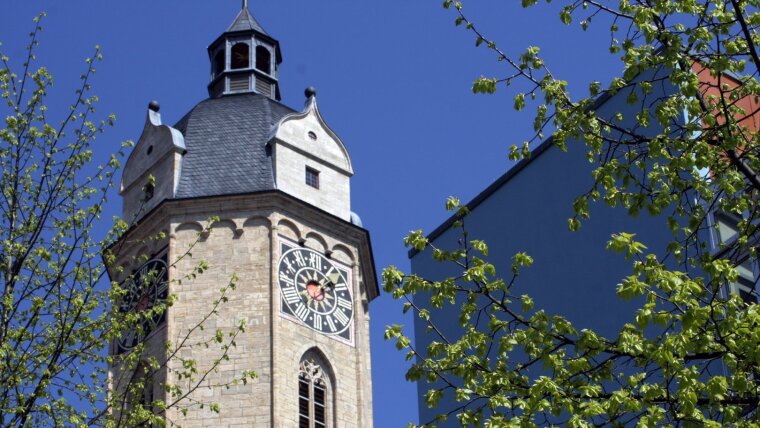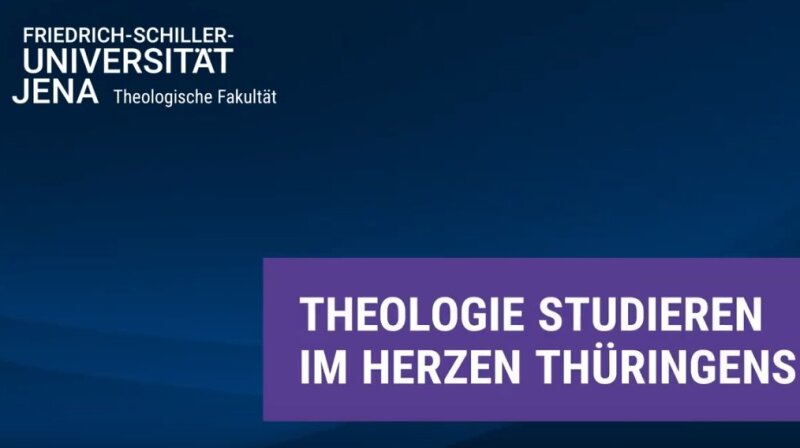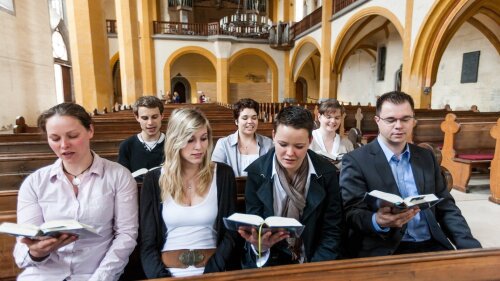
- Degree
- Diploma/church board examination
- Admission restriction
- without admission restriction (without NC)
- Duration
- 10 Semesters
- Credits/ECTS
- 300
- Teaching language
- German
- Tuition fee
- None
- Semester contribution
- € 272,80
- Start of studies
- Winter semester, Summer semester
- Part-time possible
- Yes
- Institution
- Faculty of TheologyThis link requires a login
-
Basic course
The basic course lasts four semesters (plus any additional language semesters for Latin, Hebrew and Ancient Greek). You can set your focus and even attend elective courses from other study programmes.
Study content:- Old Testament: Hebrew and Aramaic scriptures of the Bible, introduction to the history of Israel and other cultures of the Ancient Near East
- New Testament: study of scripture, insight into the movement of Roman antiquity and early Christianity
- Church History: the emergence and spread of Christian doctrine and life from its beginnings to the present day
- Systematic Theology: Christian thought and interpretation in dealing with current issues (dogma) and Christian action (ethics)
- Practical Theology: theory of internal religious practice (e.g. worship, church leadership) and external religious practice (e.g. teaching, diakonia)
- Religious Education: theory and practice of religious education and discussion of innovative forms of religious education
- Religious Studies: origin of religions, historical changes and structuring, and critical examination of ideas, texts, social models, etc.
The four-week internship is ideally completed during the lecture-free period between the final semester of the basic course and the first semester of the main course. We will be happy to help you find a (specialist) internship.
An intermediate examination is taken at the end of the basic course.
More detailed information can be found in the module catalogue for the study programmepdf, 225 kb · de.
- Old Testament: Hebrew and Aramaic scriptures of the Bible, introduction to the history of Israel and other cultures of the Ancient Near East
-
Main course
The aim of the main course is to become specialized in certain areas within four to six semesters.
- Old Testament (advanced module)
- New Testament (advanced module)
- Church History (advanced module)
- Systematic Theology (advanced module)
- Practical Theology / Religious Education (advanced module)
- Philosophy (module)
- Interdisciplinary advanced module
- Religious Studies and Intercultural Theology (module)
- Elective modules
More detailed information can be found in the module catalogue for the study programmepdf, 225 kb · de.
-
Integration period
The two-semester integration period comes right at the end of the course, including the exam preparation and the individual components of the final examination.
- Integration module I and II
- Academic paper
- Practical theological draft
- Examinations
More detailed information can be found in the module catalogue for the study programmepdf, 225 kb · de.
- in the member churches of the Protestant Church in Germany (e.g. as a pastor, parish worker, etc.).
- in non-school education (adult education centres, ecclesiastical academies, etc.)
- at charitable institutions
- at specialist editorial offices
- at libraries, museums, foundations, cultural institutes, etc.
-
University entrance qualification
A university entrance qualification, such as a general secondary school leaving certificate, is required for admission onto the study programme.
More information on university entrance qualifications can be found here.
-
Language requirements
The study programme is taught in German. You must therefore have a very good command of German at the start of the study programme.
You will require knowledge of Latin, Ancient Greek and Hebrew to study theology. If you do not have the necessary language skills at the start of your programme, you can learn the languages at the Faculty of Theology during your studies (except German—see above).
Room 108
Fürstengraben 6
07743 Jena
Google Maps site planExternal link
Fürstengraben 6
07743 Jena
Google Maps site planExternal link
University Main Building / SSZ
Fürstengraben 1
07743 Jena
Google Maps site planExternal link
Office hours:
We offer consultations in person, by telephone, and via Zoom. You can make an appointment by calling us on +49 3641 9-411111 (Mondays to Fridays from 9:00 to 11:00) or outside these office hours on +49 3641 9-411200. You can also use our remote help desk.
Consultation hours:
Mondays, Tuesdays, Thursdays and Fridays (9:00 to 12:20), Tuesdays (14:00 to 18:00), and Wednesdays and Thursdays (14:00 to 16:00).
Video chat: Zoom – Video chat Videochat ZeitenMondays to Fridays (12:30 to 13:00) Password ZSB2020 Data protection informationpdf, 183 kb
University Main Building, Room E065
Fürstengraben 1
07743 Jena
Google Maps site planExternal link
Opening hours:
Mondays (10:00 – 12:00)
Tuesdays (13:00 – 15:00)
Wednesdays (10:00 – 12:00)
Thursdays (13:00 – 15:00)
Fridays (10:00 – 12:00)
You can also use our remote help desk at
www.uni-jena.de/service-ssz
or send us your enquiries by post.
Telephone hours:
Mondays to Fridays
(9:00 – 11:00)
Postal address:
Friedrich-Schiller-Universität Jena
Studierenden-Service-Zentrum
07737 Jena
University Main Building
Fürstengraben 1
07743 Jena
Google Maps site planExternal link


